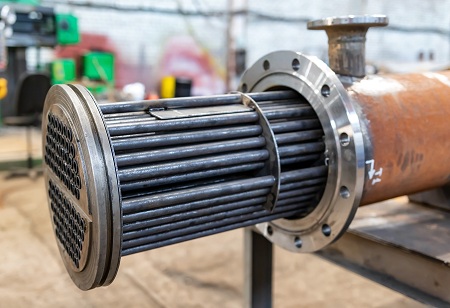Heat exchangers are rising in prominence across industry sectors with the increasing need for heating and cooling applications. Be it about efficient use of energy or dissipation of heat, its use cases are multifarious and multiplying day by day. Although it is useful in a host of industries, the power generation sector has its primary implementation. Irrespective of the fuel used, the thermal power plants have an indispensable need for
heat exchangers for the purpose of condensing, sub-cooling, pre-heating and heat extraction. Based on the types of thermal plant, the only difference is in the form of operating temperatures but the usage of heat exchangers is unquestionable.
In the case of nuclear plants, heat exchangers prove their efficacy when it comes to cooling of the wet storage. For storage of renewable energy, heat exchangers assume the role of gas and electrolyte coolers. As the industry goes ahead on the technological transformation ride, increasing demand for automation and smooth operations will keep making the case for heat exchangers. Even in the non-industrial sector, they are finding applications rapidly.
In residences, there is an increasing need to manage the air quality and humidity issues without opening a window. Air-to-air heat exchangers are proving useful in such cases by bringing two air streams of different temperatures into thermal contact, and transferring heat from the exhausting inside air to incoming outside air during the heating season.
Driven by the technological advancements
With increasing urbanization, the growth of heat exchanger market is evident. There are several types of heat exchangers that are commercially available, namely shell & tube heat exchanger, plate & frame heat exchangers, air-cooled heat exchangers and more. Driven by the technological advancements and rising adoption, India heat exchangers market is anticipated to grow at a CAGR of more than 8 per cent till 2026. Market studies suggest that the growth of the heat exchangers market in India is primarily driven by rapid industrialization that has in turn resulted in increasing demand and adoption of process plant equipment.
“The market for heat exchanger in year 2021 will have at least 5 to 6 percentage growth in comparison to previous year. But the major challenges faced are the volatility in prices of metals and high cost of production, which are likely to affect heat exchangers market negatively and clients are mostly holding their decisions for unknown period for new investments,” says Girishkumar Bhootaka, CEO at MECh Engineers.
Apart from the power sector, heat exchangers also play an important role in the food industry as they are used for management of heat produced during the production process of fruit pulp, food paste, juices, hazel nut pastes, yoghurts, and more. Likewise, many industries in India have implemented advanced heat exchangers to address the challenge of energy loss which is unaffordable given the exorbitant cost of energy. As the implementation spreads further, the competition in the market is getting tough between the manufacturers of heat exchangers, which is in turn leading to their expedited technological evolution.
